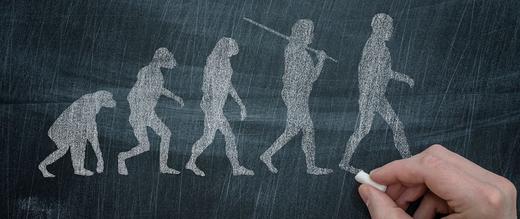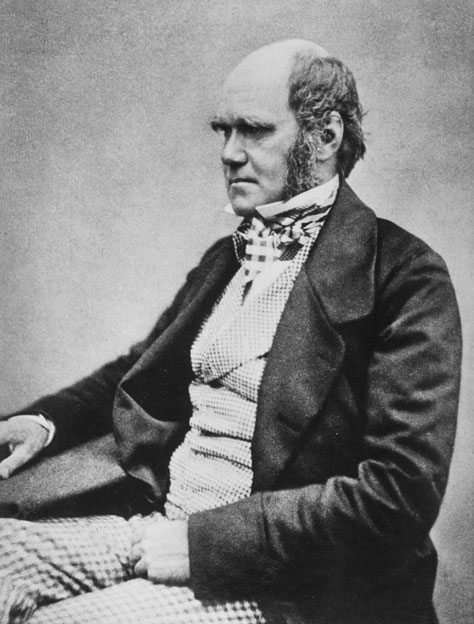The views expressed in our content reflect individual perspectives and do not represent the authoritative views of the Baha'i Faith.
Author Charles Darwin (1809-1882), the British naturalist and geologist, became famous for his pronouncement “Man descended from the apes” in his 1859 book The Origin of Species by Means of Natural Selection–right?
Well, not so much. Having read his book, in tiny print I might add, and finishing it along with Darwin’s The Descent of Man (first published in 1871) this morning, I could not find those words or that phrase in their combined 924 pages.
Here’s Darwin’s short biography from Wikipedia:
Charles Robert Darwin…best known for his contributions to evolutionary theory. He established that all species of life have descended over time from common ancestors, and in a joint publication with Alfred Russel Wallace introduced his scientific theory that this branching pattern of evolution resulted from a process that he called natural selection, in which the struggle for existence has a similar effect to the artificial selection involved in selective breeding.
Darwin, through his precise observations of plants, animals and human tribes, and citing other works as well, overcame the then-current scientific concept of “transmutation” to refer to species who have had biological changes through hybridization. The scientists of the time had to invent terms to describe their theories, and after the publication of Origins–and several severe debates—the term “evolution” was coined. The scientific community and much of the general public had accepted this new term by 1870. Today, in modified form, science has developed a broad consensus recognizing natural selection as the basic mechanism of evolution.
Reading Darwin’s books, you can see that he became the consummate observer, recorder and synthesizer of these important theories during his lifetime. Whereas Origin has 374 pages, along with a twelve page glossary, Descent is written in three discrete parts for a total of 534 pages and supplemental notes, at least in my undated copy. The reading can seem somewhat tedious–yet every page brings a new discovery or insight, or more importantly, the basis for later insight and conviction.
The Descent of Man had a much greater influence on science than Origin did, especially in describing the evolutionary history of humanity. Darwin notes all the similarities humans have to animals, even to the downy hair on some of us, the vestiges of much thicker coverings in the past. He describes mating and birth and the bones and senses of man and compares them closely to all mammals. Finally he writes:
…that man with all his noble qualities, with sympathy which feels for the most debased, with benevolence which extends not only to other men but to the humblest living creature, with his god-like intellect which has penetrated into the movements and constitution of the solar system–with all these exalted powers–Man still bears in his bodily frame the indelible stamp of his lowly origin. – Descent, p. 405.
He goes on to state an important fact, on which myself and most religionists would agree, from as early as the story of Adam and Eve’s creation: “If we consider all the races of man as forming a single species, his range is enormous.” This idea—the essential oneness of all humanity—came originally from the Baha’i teachings, several years previous to Darwin’s writings on the subject.
So if you want to learn about Darwin’s theory, I’d recommend The Descent of Man as the better book to read regarding human evolution. While it may not answer the old question “Did Darwin say we humans descended from apes?” it does a good job of establishing the science of evolutionary theory pretty conclusively. Darwin wrote on page 895 of Descent: “Man, as I have attempted to show, is certainly descended from some ape-like creature”–which makes sense, given our most recent anthropological discoveries. As we now know, with the physical identification of the bones of pre-Neanderthal, Neanderthal and Cro-magnon Man, the tree of human evolution has many branches, and some we have yet to find.
Baha’is believe that science and religion agree—so the Baha’i teachings have a unique and very science-friendly perspective on human evolution. They maintain that although human beings at one time certainly took the form of an “ape-like creature,” our uniqueness, our heritage and our spiritual destiny is much more than that of any animal, either now or in the dim past. Abdu’l-Baha pointed out, in the book Some Answered Questions, that human evolution certainly occurred, but that the human species has always been human:
…as man in the womb of the mother passes from form to form, from shape to shape, changes and develops, and is still the human species from the beginning of the embryonic period — in the same way man, from the beginning of his existence in the matrix of the world, is also a distinct species — that is, man — and has gradually evolved from one form to another. – Abdu’l-Baha, Some Answered Questions, p. 193.
You May Also Like
Comments


















According to the Bible, Adam and Eve were the first humans created by God, who lived approximately 6,000 years ago. According to the science, humans existed a long time before. The two lines of thought can be easily united, thanks to the omnipotence of God, who in the beginning created humans in a reality where there was no concept of "evil". Metaphorically speaking, Adam and Eve were expelled from this heavenly reality, find himself in another reality, namely in today's reality that we all know, where there is the concept of evil, as well as that of the well; not necessarily a reality where they were the first humans, but the first who experienced firsthand the life God had reserved for them (so they were the first humans in the "perfect" reality). From here it is clear that the story of Adam and Eve does not upset in the least bit the evolutionary linearity, and the seven days of creation relate to a creation took place in the reality of Adam and Eve, where everything was possible, even just create the stars, animals and everything else, without the scientific method and the time needed to have their share. In practice, they were the first men of God; whereas prehistoric man lived before Adam and Eve was a man, but it could be considered as an animal evolved from apes or created by something else, which had two arms and two legs, and that may have hybridized with the descendants of Adam And Eve after they were "moved away" from the "perfect reality". God has endowed man about the concept of "infinity" and "eternity", as well as other questions can not be explained through the use of the scientific method, thus making humans free to believe in God or not, in a reality for us tricky and necessary for the construction and continuation of his project.
"You will hardly find one among the profounder sort of scientific minds without a religious feeling of his own… The scientist is possessed by a sense of universal causation. His religious feeling takes the form of rapturous amazement at the harmony of natural law, which reveals an intelligence of such superiority that, compared with it, all the systematic thinking and acting of human beings is an utterly insignificant reflection. This feeling is the guiding principle of his life and work… It is beyond question closely akin to that which has possessed the religious geniuses of all ages.'
Interestingly, i m o, his words above from 1934 even point to a progressive revelation notion which is essentially the gift of God to this generation.
What I try to convey in 2014 when God's most recent religious Administration in excess of 30 years is sadly suspended for now vis-a-vis enrollments at about six million is the validity of prioritizing proofs of God's existence. Given that young Baha'is carry much of the load as far as reaching the wider world is concerned and that most young people today are virtually atheists it's important to arm Baha'i warriors with proofs that disarm those legions of atheists who cannot be trusted. What an uphill battle we place on young shoulders to engage their generation vis-a-vis Baha'u'llah's healing message when the majority of their interlocutors disdain the mere mention of the word - Divine! Baha'i scholars such as professor Kluge in recent years have dismantled the demonstrably false and provably dangerous claims of Dawkins and Hitchens pertaining to atheism but, alas, this recent Baha'i scholarship of the highest caliber is necessarily beyond the ken of many of us due to its many technical terminologies and it remains largely confined to academic circles - just for the time being in that cerebral form among our scholars - Inshallah.
One last tuppence worth; given that the Father has returned as the Promised One of all the peoples of the world and revealed the many things that the Son, Jesus, said, we were not yet ready for 2,000 years ago, how can it be that Baha'is from a point of logic, in its many definitions, could be in any way unable to prove the existence of God??? This is such a fundamental issue in a world riven by atheism and materialism that I for one, as a rank amateur, endeavor to reconvene the court of public opinion in the interests of consultation for academic and lay person alike